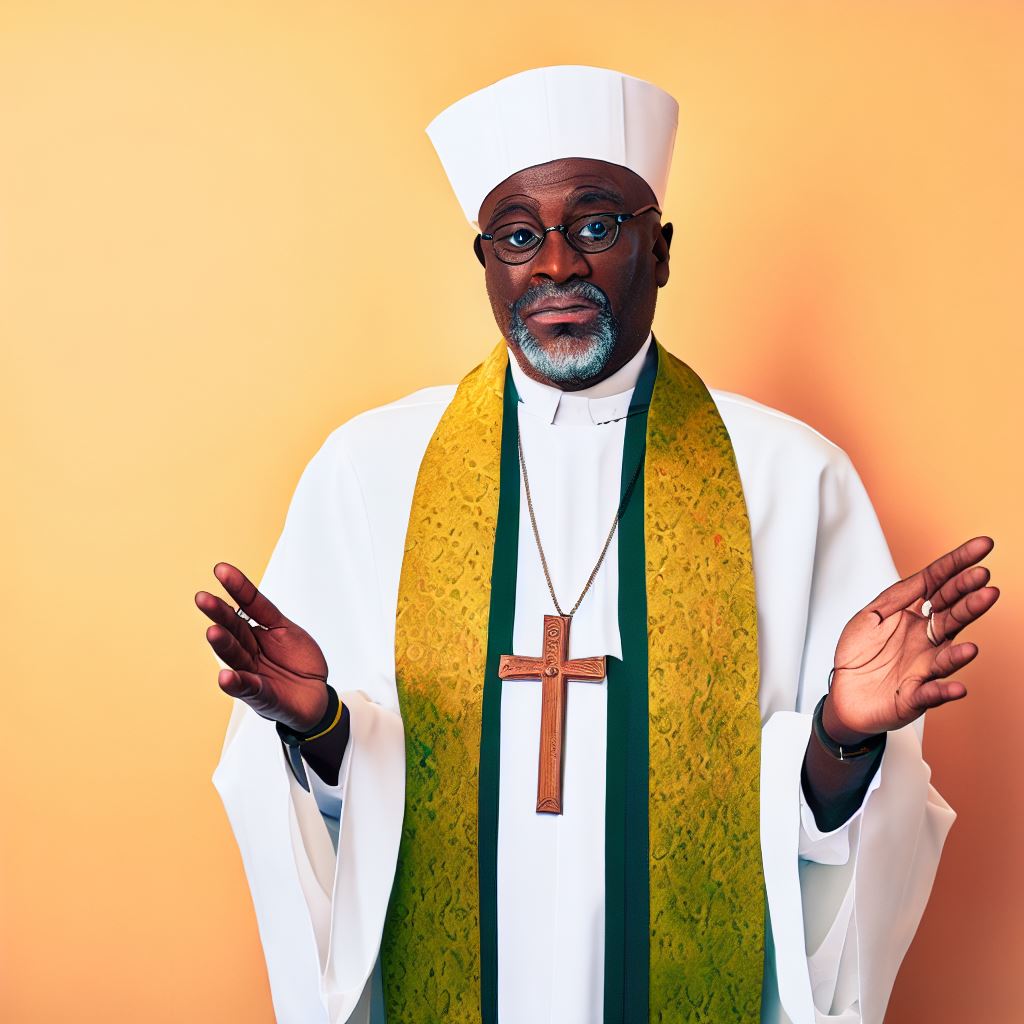Understanding the Role of a Religious Counselor in Nigeria
Definition and Purpose
A religious counselor provides spiritual guidance to individuals.
This role focuses on fostering personal and community growth.
Moreover, it aims to assist individuals in overcoming emotional challenges.
Core Responsibilities
Religious counselors engage in active listening with their clients.
They offer insights based on religious teachings and principles.
Additionally, they conduct counseling sessions to address personal issues.
They may also lead group discussions and workshops.
Skills Required
Effective communication skills are vital for success in this role.
Additionally, empathy and compassion are essential traits.
Counselors should also possess strong problem-solving abilities.
They need to have a deep understanding of their religious texts.
Educational Background
Most religious counselors hold a degree in theology or social work.
They often pursue additional certifications in counseling techniques.
Continuous education is crucial for staying updated on counseling practices.
Ethical Considerations
Maintaining confidentiality is one of the primary ethical standards.
Counselors must avoid imposing personal beliefs on clients.
They should also be culturally sensitive to various backgrounds.
Career Opportunities
Religious counselors can work in churches, mosques, or community centers.
Some may choose to offer private counseling services.
Additionally, they might work with non-governmental organizations.
Educational Requirements and Training for Aspiring Religious Counselors
Understanding the Educational Pathway
Becoming a religious counselor requires a solid educational foundation.
Many counselors begin with a bachelor’s degree in theology or religious studies.
This education provides essential knowledge about different religions.
Furthermore, a psychology or social work degree can also be beneficial.
Pursuing Advanced Degrees
Many aspiring counselors choose to pursue a master’s degree.
A master’s in divinity or counseling enhances one’s credentials.
This degree often includes coursework in counseling techniques and ethics.
Additionally, practical experience through internships is crucial.
Obtaining Relevant Certifications
Certification is vital in establishing credibility in this sector.
Many organizations offer certification for religious counselors.
Examples include the American Association of Pastoral Counselors.
Securing certification typically requires passing an examination.
Gaining Practical Experience
Experience plays a significant role in developing counseling skills.
Internships provide an opportunity to work under licensed professionals.
Many candidates engage in volunteer work at local churches or counseling centers.
This hands-on experience helps build confidence and competence.
Continuing Education and Professional Development
Continuous learning is important for a successful counseling career.
Workshops and seminars provide updated knowledge and skills.
Furthermore, pursuing further education strengthens one’s expertise.
Staying informed about trends in religious counseling is essential.
Skills and Qualities Necessary for Success in Religious Counseling
Empathy and Understanding
Empathy is crucial for religious counselors in Nigeria.
Understanding the struggles of clients helps build trust.
Clients need to feel comfortable sharing their feelings.
Religious counselors should listen actively and respond compassionately.
Cultural Competence
Nigeria is home to diverse cultures and religions.
Counselors must respect and understand these differences.
Awareness of cultural backgrounds enhances counseling effectiveness.
Using culturally relevant approaches can improve client relationships.
Strong Communication Skills
Effective communication is vital in religious counseling.
Counselors must express themselves clearly and respectfully.
The ability to articulate thoughts allows for better discussions.
Counselors should also practice active listening to validate clients.
Spiritual Grounding
A strong spiritual foundation can guide religious counselors.
This grounding helps counselors navigate complex spiritual issues.
It also enhances their authenticity in client interactions.
Counselors should remain open to continuous personal spiritual growth.
Problem-Solving Skills
Religious counselors often face challenging situations.
They need to develop effective problem-solving strategies.
Critical thinking helps them offer pragmatic solutions.
Collaboration with clients fosters joint problem-solving efforts.
Patience and Resilience
Patience is essential when working with clients in distress.
Counselors will encounter resistance or slow progress.
Maintaining a positive attitude can inspire hope in clients.
Resilience allows counselors to cope with emotional challenges.
Continuous Learning
The field of religious counseling is constantly evolving.
Counselors should commit to lifelong learning and development.
Attending workshops and seminars enhances their skills.
Staying updated on new therapeutic techniques is beneficial.
Gain More Insights: Building a Meaningful Career as a Youth Pastor in Nigeria
Finding Mentorship and Guidance within Religious Communities
The Importance of Mentorship
Mentorship plays a crucial role in personal and professional development.
It provides guidance and support during challenging times.
Having a mentor can accelerate your learning process.
Moreover, mentors offer valuable insights into the field of religious counseling.
Identifying Potential Mentors
Start by identifying individuals within your religious community.
Look for experienced counselors or leaders in your faith.
Consider reaching out to religious education instructors.
Additionally, community elders often have wisdom to share.
Building Relationships with Mentors
Approach potential mentors respectfully and express your interest.
Be clear about your goals and aspirations in religious counseling.
Schedule regular meetings to discuss your progress and challenges.
Furthermore, show appreciation for their time and guidance.
Engaging with Religious Institutions
Join religious organizations that offer counseling programs.
Participate in workshops and seminars to enhance your skills.
Networking within these institutions can lead to mentorship opportunities.
Volunteering can also increase your visibility in the community.
Seeking Feedback and Guidance
Regularly seek feedback from your mentors on your counseling style.
Ask for constructive criticism to improve your skills.
Publish Your Professional Profile, Business or Brand
Showcase your expertise, gain trust, and boost visibility instantly on Professions.ng.
Publish NowStay open to their advice and suggestions for growth.
This feedback is essential for building confidence in your abilities.
Continuing Education and Training
Participate in continuous education programs related to counseling.
This keeps you informed about new developments in the field.
Many religious communities offer training sessions for aspiring counselors.
Seek out certifications that can enhance your credibility.
Explore Further: How to Build a Fulfilling Career as a Religious Counselor in Nigeria
Building a Client Base: Networking and Community Engagement
Understanding the Importance of Networking
Networking forms the backbone of building a successful counseling practice.
It allows you to connect with potential clients and referral sources.
Additionally, effective networking fosters trust and credibility in your community.
Identifying Your Target Audience
Start by identifying the demographic you wish to serve.
Consider factors such as age, gender, and specific spiritual needs.
Tailor your outreach strategies to meet the needs of your target audience.
Engaging with Local Communities
Participate in local community events to establish your presence.
Offer free workshops or seminars on relevant topics, such as stress management.
This demonstrates your expertise and willingness to help others.
Utilizing Social Media Effectively
Leverage social media platforms to connect with a broader audience.
Share valuable content that addresses common concerns within your community.
Engage with followers by responding to comments and questions.
Building Relationships with Local Churches
Develop partnerships with local religious organizations.
Offer to provide counseling services to their congregations if needed.
Collaboration enhances your visibility and helps build a solid client base.
Networking with Other Professionals
Establish relationships with other counseling professionals.
Attend workshops, seminars, or conferences to meet potential collaborators.
This can lead to referrals and valuable exchange of ideas.
Feedback and Continuous Improvement
Regularly seek feedback from clients to improve your services.
Consider conducting surveys or informal interviews after sessions.
Listening to your clients helps refine your approach and enhances satisfaction.
See Related Content: How to Serve as a Pastor and Impact Lives in Nigeria

Navigating Ethical Considerations in Religious Counseling
Understanding Ethical Guidelines
Religious counselors must adhere to ethical guidelines in their practice.
These guidelines help protect both the counselor and the client.
Ethics emphasize respect, confidentiality, and integrity.
Counselors should familiarize themselves with their religious institution’s policies.
Maintaining Confidentiality
Confidentiality is crucial in religious counseling.
Clients need assurance that their information remains private.
Counselors should discuss confidentiality openly with clients.
Exceptions to confidentiality should be explained clearly.
For example, if a client poses a risk to themselves or others, disclosure may be required.
Respecting Diverse Beliefs
Religious counselors encounter clients from various backgrounds.
Respect for diverse beliefs is essential in providing effective counseling.
Counselors should approach each client with cultural competence.
This includes acknowledging and valuing different religious practices.
Ultimately, understanding clients’ perspectives fosters trust and openness.
Setting Boundaries
Establishing professional boundaries is critical in counseling relationships.
Counselors should communicate their roles clearly to clients.
Boundaries help maintain a professional relationship and prevent dual relationships.
Involvement in clients’ personal lives beyond counseling can lead to ethical dilemmas.
Continuous Professional Development
Ethical practice requires ongoing education and training.
Counselors should stay updated on current ethical standards and practices.
Engaging in professional development ensures counselors provide competent care.
Attending workshops and seminars can enhance skills and knowledge.
Furthermore, supervision and peer feedback can improve ethical decision-making.
Learn More: Top Religious Professions Making an Impact in Nigeria
Continuing Education and Professional Development Opportunities
Importance of Ongoing Education
Ongoing education is crucial in religious counseling.
It helps counselors stay updated on best practices.
Additionally, it enhances personal and professional growth.
Available Programs and Courses
Many institutions offer relevant programs in Nigeria.
Organizations like the Nigerian Association of Counselors provide training.
Local universities also have counseling courses available.
Online platforms offer flexible learning options.
Key Subject Areas
- Spiritual Counseling Techniques
- Crisis Intervention Strategies
- Ethics in Religious Counseling
- Cultural Sensitivity Training
Workshops and Seminars
Workshops are excellent for hands-on learning.
Participating in seminars helps build a professional network.
Many of these events feature experienced speakers.
Local and National Events
- Annual Nigerian Conference on Counseling
- Workshops by the Christian Association of Nigeria
- Webinars from mental health organizations
Professional Certifications
Certifications enhance credibility in religious counseling.
Obtaining certifications demonstrates commitment to the profession.
Several certification programs exist in Nigeria.
Recognized Certification Bodies
- Nigerian Association of Christian Counselors
- International Board of Christian Counselors
- Association for Clinical Pastoral Education
Networking and Mentorship
Networking plays a vital role in career development.
Connecting with other professionals opens new opportunities.
Mentorship can offer valuable guidance and advice.
Finding Mentors
- Join local counseling associations
- Attend community events and workshops
- Reach out to experienced counselors for guidance
Exploring Career Opportunities in Different Religious Organizations
Understanding Religious Organizations in Nigeria
Nigeria is home to diverse religious organizations.
Each organization offers unique opportunities for counselors.
Major religions include Christianity, Islam, and traditional African beliefs.
Christian Organizations
Christian organizations play a significant role in counseling.
Many churches have dedicated counseling ministries.
For example, the Redeemed Christian Church of God provides various support services.
Pastoral counseling is a common area for spiritual guidance.
Additionally, NGOs like the Christian Association of Nigeria advocate for community support.
Islamic Organizations
Islamic organizations also offer counseling roles.
Many mosques provide spiritual and emotional guidance.
The Muslim Welfare Foundation focuses on social services.
Training is available for individuals interested in counseling.
Moreover, imams often play crucial roles in providing support.
Traditional Religious Organizations
Traditional belief systems are significant in Nigeria.
Counseling in this context focuses on community and family support.
Spiritual leaders serve as guides in various communities.
Organizations like the Association of Traditional Religion Practitioners exist for support.
These bodies often seek trained counselors to support their missions.
Publish Your Professional Profile, Business or Brand
Showcase your expertise, gain trust, and boost visibility instantly on Professions.ng.
Publish NowNon-Governmental Organizations
NGOs often collaborate with religious organizations.
They provide counseling services for mental health and social issues.
Organizations like the Nigerian Red Cross are involved in community outreach.
Collaboration expands the range of services offered to the public.
Being part of these initiatives can enhance your counseling career.
Networking and Professional Development
Networking is vital for success in this field.
Attend workshops and conferences hosted by religious organizations.
These events facilitate connections with experienced counselors.
Online platforms also offer forums to exchange ideas and resources.
Consider mentorship programs provided by established organizations.
Implications of Counseling Opportunities
The landscape of religious counseling in Nigeria is rich and varied.
Explore different organizations to find the right fit for your skills.
Engage actively with communities to build your reputation.
Your passion and training can lead to a fulfilling career.
Additional Resources
Is it appropriate to use a bachelor of theology to apply for a master’s …
Because He First Loved Us, We Can Face Almost Anything: Akbar …




